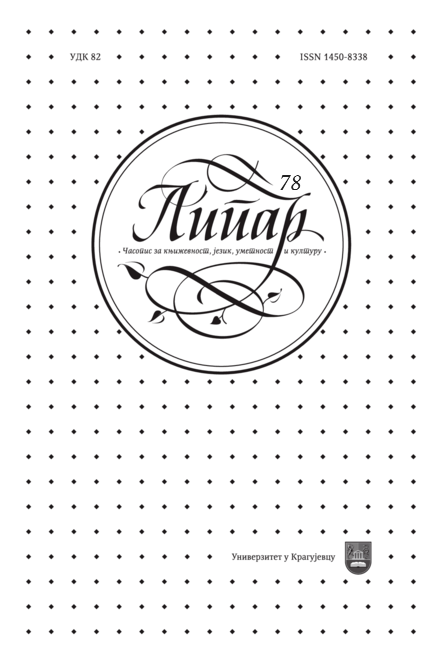ФИКЦИОНАЛНА ДЕЛА О ГОЛОМ ОТОКУ У СРПСКОЈ КЊИЖЕВНОСТИ КОЈУ ПИШУ ЖЕНЕ / ЖЕНЕ КАО ГЛАВНЕ, ФИКЦИОНАЛИЗОВАНЕ ЈУНАКИЊЕ У РОМАНИМА О ГОЛОМ ОТОКУ
FICTION WORKS ABOUT GOLI OTOK IN SERBIAN LITERATURE WRITTEN BY WOMEN / WOMEN AS MAIN, FICTIONALIZED HEROINES IN NOVELS ABOUT GOLI OTOK
Author(s): Slavica O. Garonja RadovanacSubject(s): History, Language and Literature Studies, Jewish studies, Studies of Literature, Comparative history, Local History / Microhistory, Social history, Recent History (1900 till today), Jewish Thought and Philosophy, WW II and following years (1940 - 1949), Post-War period (1950 - 1989), History of Communism, Historical revisionism, Fascism, Nazism and WW II, History of the Holocaust, Post-Communist Transformation, History of Antisemitism, Theory of Literature, Wars in Jugoslavia
Published by: Универзитет у Крагујевцу
Keywords: IB Resolution; Goli otok;women’s novel; fictionalization; victims of the Goli Otok as literary heroines
Summary/Abstract: In this paper, we consider the phenomenon of fictionalization of the theme of the Goli otok in novels (mostly written by women), as a kind of collective and ideological trauma, which has been a taboo topic in socialist Yugoslavia for more than 40th years. Biljana Jovanović (Duša, jedinica moja, 1984) and Boba Blagojević (Skerletna luda, 1991) started the topic of Goli otok in a women’s ideological novel and after that the topic of IB Resolution continued through different genres: publicist- memoir work (Ženi Lebl), autobiographical novel (Vera Cenić), or a real postmodern novel by Milka Žicina (Sve, sve, sve, 2002), all the way to a modern novel, with a fictional protagonist, which combines all the experiences of the Goli Otok`s victims (G. Zalad, Plava tišina, D. Grossman, Život se sa mnom mnogo poigrao). We divide the origin of these novels into the works of women writers who personally experienced torture of Goli otok (Ž. Lebl, V. Cenić, M. Žicina, Eva Panić), and those who were born much later, dealt with this topic completely through the fiction (G. Zalad, D. Ilić, D. Grosman). V. Cenić and M. Žicine also created several impressive literary heroines, whose degree of fictionalization we have specifically analyzed here as literary heroines (Brana Marković, Dragica Srzentić, Slavka Pogačarević, Eva Panić Nahir), as well as the type of antiheroine in the character of Marija Zelić, the warden of the camp on Goli Otok. These are works whose literary qualities should be much more present on our literary scene, and with a good film adaptation they should enter a much wider, public reception, especially since film as a medium is the main subtext of two modern novels about Goli Otok (G. Zalad, D. Grosman).
Journal: Липар - часопис за књижевност, језик, уметност и културу
- Issue Year: XXIII/2022
- Issue No: 78
- Page Range: 63-96
- Page Count: 34
- Language: Serbian

